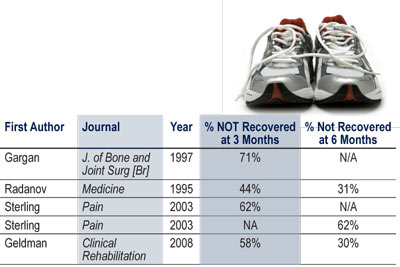The effect of pre-injury physical fitness on the initial severity and recovery from whiplash injury, at six-month follow-up
Clinical Rehabilitation April 2008; 22: pp. 364–376Mark Geldman, Ann Moore and Liz Cheek
In this study:
• 58% of whiplash-injured patients had not reached functional recovery at 3 months.
• 30% of whiplash-injured had not reached functional recovery at 6 months.
These authors reference the following studies and results:
1. Gargan M, Bannister G, Main C, Hollis S. The behavioural response to whiplash injury. J Bone Joint Surg Br 1997; 79: 523–26. This study found that 71% of whiplash-injured patients had not recovered at 3 months.
2. Radanov BP, Sturzenegger M, Stefano GD. Long-term outcome after whiplash injury: a 2-year follow-up considering features of injury mechanism and somatic, radiologic, and psychosocial findings. Medicine 1995; 74: 281–97. This study found that 44% of whiplash-injured patients had not recovered at 3 months, and that 31% had not recovered at 6 months.
3. Sterling M, Jull G, Vicenzino B, Kenardy J, Darnell R. Development of motor system dysfunction following whiplash injury. Pain 2003; 103: 65–73. This study found that 62% of whiplash-injured patients had not recovered at 3 months.
4. Sterling M, Kenardy J, Jull G, Vicenzino B. The development of psychological changes following whiplash injury. Pain 2003; 106: 481–89. This study found that 62% of whiplash-injured patients had not recovered at 6 months.

CLINICAL MESSAGES FROM AUTHORS:
1. “Moderate to high levels of pre-injury physical fitness enhance the chances of early recovery following whiplash injury.”
2. “Aerobic-based fitness should be encouraged in frequent road users.”
3. “Low pre-injury physical fitness is highly predictive of poor recovery following whiplash injury.”
KEY POINTS FROM DR. DAN MURPHY
1. In the studies referenced, between 44% to 71% of whiplash-injured patients have not recovered by 3 months after being injured.
2. In the studies referenced, between 30% to 62% of whiplash-injured patients have not recovered by 6 months after being injured.
3. In this study:
• A) 58% of the patients had not reached functional recovery at 3 months.
• B) 30% had not reached functional recovery at 6 months.
4. 50% of whiplash-injured patients “require more than one month off work.”
5. “There is a great deal of evidence linking low levels of aerobic fitness to increased incidence of various injuries and diseases.”
6. “Individuals with medium to high levels of pre-injury physical fitness were much more likely to recover from whiplash injury than those with low levels of pre-injury physical fitness.”
7. “Pre-injury physical fitness did have a markedly significant effect on recovery at both three months post injury and six months post injury, with recovery being significantly better for the medium and high fitness groups.”
8. “These findings strongly suggest that individuals with low levels of recreational physical activity are at markedly greater risk of poor recovery from whiplash injury.”
9. “At three months, no (0 of 16) individuals with low fitness had functionally recovered compared with 51% (39 of 77) of individuals with greater levels of recreational physical activity.”
10. “At six months, 35% (6 of 17) of individuals with low fitness had functional recovery compared with 80% (53 of 67) of those with higher physical fitness.”
11. “Individuals who perform no regular recreational exercise recover less well than individuals who perform 10–60 minutes of moderate activity per week; thus, even moderate levels of activity confer some recovery benefits.”
12. Individuals who did more than 3 hours of heavy physical activity per week (e.g., running) recovered slightly less well than individuals with moderate levels of physical activity. “A possible explanation why individuals with very high levels of activity recover less well compared with those with moderate levels of activity may be due to the effect of over training, which can inhibit the immune system.”
13. “Individuals with medium/high pre-injury fitness were almost twice as likely to return to their usual work within the first three months as individuals with low fitness.”
14. “Low pre-injury physical fitness is a highly specific predictor of failure to recover from whiplash injury.”
15. “Moderate to high levels of pre-injury physical fitness enhance the chances of early recovery following whiplash injury.”
COMMENTS FROM DR. DAN MURPHY
This study makes it quite clear that many whiplash-injured patients have not recovered from their injuries at 3 and 6 months post trauma. This study also makes it clear that we should ask our whiplash-injured patients about how often they engage in physical exercise, as low levels of fitness are associated with a poor prognosis for recovery.
Dr. Dan Murphy graduated magna cum laude from Western States Chiropractic College in 1978. He received Diplomat status in Chiropractic Orthopedics in 1986. Since 1982, Dr. Murphy has served part-time as undergraduate faculty at Life Chiropractic College West, currently teaching classes to seniors in the management of spinal disorders. He has taught more than 2000 postgraduate continuing education seminars. Dr. Murphy is a contributing author to both editions of the book Motor Vehicle Collision Injuries and to the book Pediatric Chiropractic.
